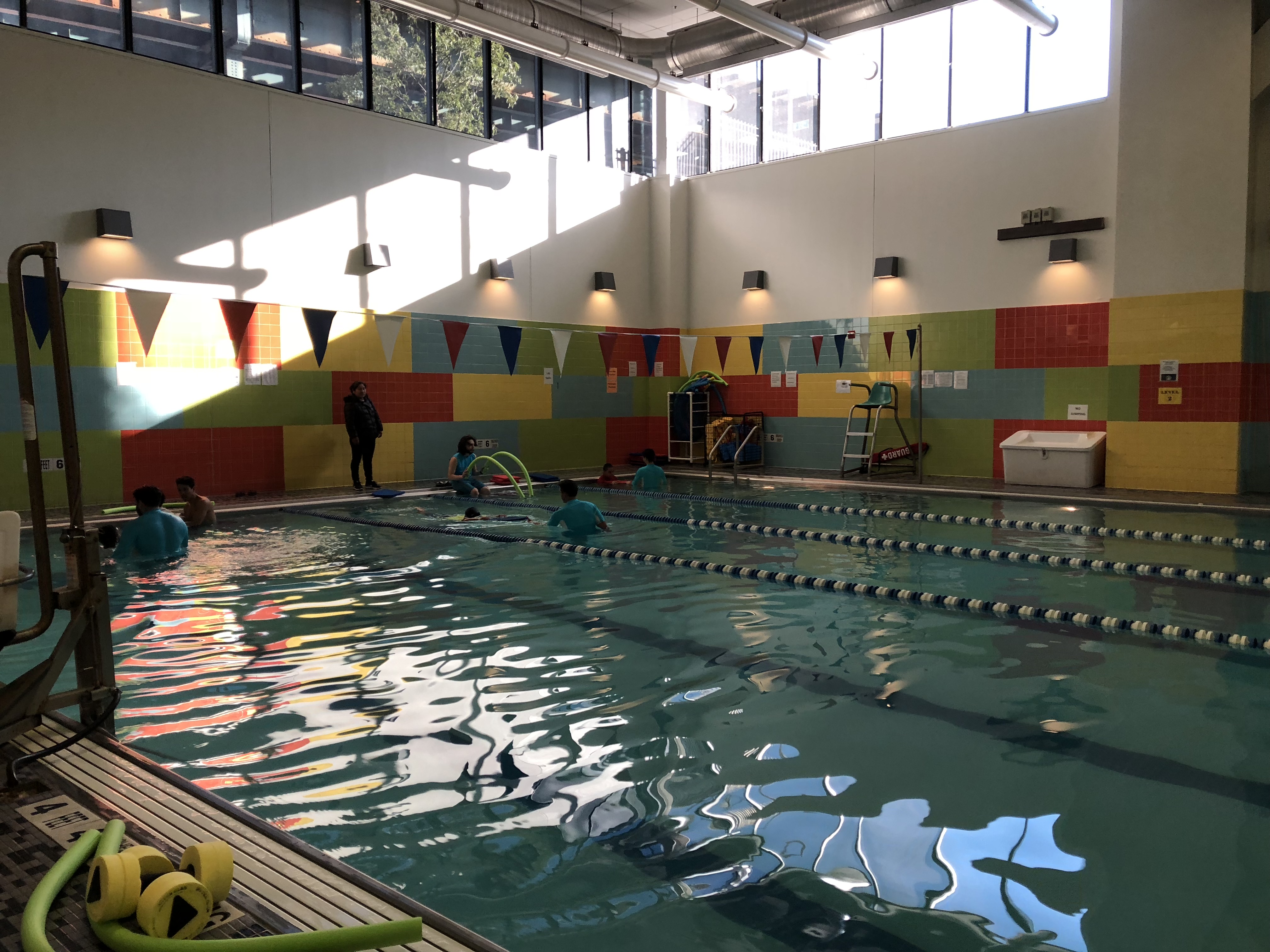Strike A Chord: Teaching Autistic Children How To Swim Can Help Them Reach Beyond The Finish Line

Florencio Flores-Palomo faced his fear of water to create a swimming organization to empower special needs children
The sound of kicking and laughing mixed with chlorine fills the air at New Settlement Community Center in the Bronx. Children are learning how to swim as they work on kicking and arm movement with the organization REACH. The program is designed for children of all ages and abilities, and the pool is surrounded by bright colorful tiles signifying a safe place.
Florencio Flores-Palomo is the founder of REACH and works with about 140 families from all over Manhattan and the Bronx. He says he is always welcoming new members. Flores-Palomo says all children – whether typical or living with disabilities – are welcomed.
“When you walk through our doors, everybody’s equal.” Flores-Palomo says. “We call it our reach magic. So there’s no such thing as somebody’s less then or more talented or their skill are more important.”
Flores-Palomo grew up on a farm in Nebraska where he almost drowned in a creek when he was eight. After his experience he says he was crippled with fear of the water for 23 years. Flores-Palomo says he moved from Nebraska to New York within a week of applying to a job as a pool manager. The job required him to tolerate his fear of water, but that fear turned into love very quickly. He decided to take swim lessons and was taught by a woman he calls his angel, Judy Hewitt.
“She was a paraplegic. She had a back injury, so she couldn’t physically get in the water with me, but she understood and saw the fear,” Flores-Palomo explained.
Flores-Palomo inspiration to start REACH developed after he conquered his fear of water. He had finished swimming classes three months later, and Hewitt asked him to swim with a group of kids who were a part of the Special Olympics. He says the experience was inspiring.
“Mind you I still didn’t know how to swim so the kids were making fun of me thinking 'how can we be better swimmer than this old man?'” Flores-Palomo laughs at the memory.
Flores-Palomo remembers Hewlitt who died in 2016, before REACH was fully up and running. He says Hewlitt always had a vision about his developing relationship with swimming and the special needs community.
“She told me not only do you have a strong career in aquatics, but working with special needs kids is your niche,” Flores-Palomo said. He said it took him some time to believe what Hewlitt said, but eventually she was right.
Jennifer Cruz is a parent who takes her three year old son, Jonathan, to REACH. Jonathan was diagnosed with autism two years ago, and Cruz says she wanted to find a program for him to learn how to be safe around and in water.
“I’m a special needs teacher, and I know that many accidental deaths involving kids with autism have to do with water.”
Cruz says Jonathon was non-verbal when he first started REACH. She says he took to the skill and was a natural in the water. Cruz says she has watched Jonathon grow and develop skills far beyond the pool.
“He actually said his first words in the pool. He swam a lap and when he reached the other side he said ‘I did it!’” Cruz says that was a proud and exciting moment for her. One that she got to share with other parents and swim coach Flores-Palomo.
“I thought he had spoken before, but when Jennifer told me it was Jonathon’s first time ever speaking, my heart was so filled,” Flores-Palamo said.
Bryna Siegel is an Autism specialist in Northern California. She has published four books including her latest, The Politics of Autism. Siegel says teaching autistic children about their surroundings may better prepare them. She explains how parents and children have an invisible rubber band between them to let them know when they have roamed too far. She uses an example of a child running away from their parent toward a swing in the park.
“At some point the rubber band gets tight and the kid will look back to see where the parent is. They’ll only go so far,” Siegel explains. “Children with autism don’t have that imaginary pull. They’ll just keep going.” Siegel says this can put children with autism in severe danger; that is why programs like REACH and others are important.
Flores-Palomo says he sees beyond safety. Throughout this program he has seen what kids are capable of achieving. He says swimming allows anyone to set personal goals. Flores-Palomo says kids are put into smaller groups based on their skill, not by their mental capabilities.
“In the water I have found that everybody is equal and that everybody can learn in a manner that, not only is conducive to them, but is able to learn together,” he said. “And I saw this over my career and thought this is working.”
Flores-Palomo says the organization’s name comes from a Gloria Estefan song called Reach. It was written for the 1996 Olympic Games and has become the organization’s official song. Florencio says Gloria Estefan has allowed it to be used in REACH’s videos and social media. He says after thinking about a name and going through his iPod for a while, he knew the song was destined for the program because of its meaning.
“The song embodies about reaching higher, achieving more and it was important to me,” he said. “When we’re teaching kids we ask them what they’re going to reach for. Reach in pools. So it’s all encompassing,” he said.

